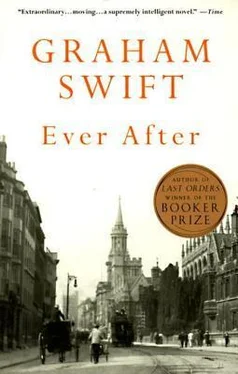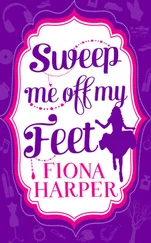But always better, it seemed to me, than to loiter in some hemmed-in station, where the great machines, in any case, slowed down to tamed, frustrated versions of their true selves, was to find some private look-out point in the peaceful yet tremulous countryside along the margins of the track — to throw your bike down in the grass and await the full, spectacular effect. The rattle of the signal wires. The whispering of the lines. The first distant, pistoned bellowing, then the full-throated fury as some mighty express — the Ocean Mail! the Cornish Riviera! — cleaved the landscape.
Between Aldermaston Wharf and Midgham, where the Reading-to-Newbury line clipped the side of the hill and entered a short cutting — a favourite spot for these enthralled vigils, so limply known as “train-spotting”—I could look out on a vista which might have formed the model for one of those contrived scenes in a children’s encyclopaedia, depicting the theme of “Old and New.” River, canal and railway line were all in view. At a single moment it would have been perfectly possible to see, in the background, the old water-mill on the Kennet, with a horse working the field before it; in the middle distance, a barge on the canal; and in the foreground, a train racing for the cutting; while no less than three road bridges provided a fair opportunity for some gleaming motor-car (complete with an inanely grinning couple in the front seats) to be brought simultaneously into the picture.
I must have seen it once — many times — that living palimpsest. And no doubt I should have been struck by some prescient, elegiac pang at the sight of those great expresses steaming only to their own oblivion, and taking with them a whole lost age. O West Country world! O creamy, bucket-and-spade summers! O thatched cottages and smugglers’ coves! O nestling market towns! O green dreams! O Mendips! O Quantocks! O England!
But I didn’t have such thoughts. Any more than I gave thought, as it shadowed my infancy, to the Second World War, whose historic rumblings occurred, so far as I was concerned, off-stage, and whose ending I recall, not for any joyous feelings of deliverance, but because it was in that summer of ’45, while the trains of the GWR reverted to their regular schedules and peacetime colours, that I was first allowed to cycle off alone on train-spying missions — a considerable and perhaps ill-advised privilege for a boy not yet turned nine, which owed much to my mother’s blithe libertarianism (“Don’t get knocked down, there’s a good darling”) and her husband’s absence. But thus my passion — and vocation — bloomed.
What a manly, mettlesome, rugged little imp I must have been. No poetry or ballet-dancers in those days, only engine drivers. And the great thing, of course, as the mighty engines sped by, was to catch a blurred and exalting glimpse of those heroes of the rails. To leap up in a frenzy of adulatory, emulatory waving, hoping for the magic return wave.
And one of those knights of steam, though I never knew it, one of those lords of the footplate (might we have waved, all unwittingly, to each other?) was — my father.
I should track him down, shouldn’t I? This mystery man, this nameless entity. My flesh and blood. I cannot picture him. I see only this generic, child’s-eye caricature: an engine-driver, for God’s sake! Worn blue jacket, twisted neckcloth and greasy cap with a flint-black peak. His eyes are screwed up against the slipstream, the obligatory pipe is clamped in the corner of his mouth — and he is mounted, appropriately enough for my surreptitious begetter, on a giant phallic symbol. I see him careering round the countryside, siring bastard after bastard. Sometimes I think he is grinning at me, leering at me — oh yes, he is waving, all right — as he rushes unrecognisably by.
But he was “killed in the war”—so how could I have waved to him in the summer of ’45? Dead even then. My very own father. Dead and beyond recall. But Matthew is dead. Matthew is even deader.…
And how far away, how beyond recall, seems even that train-mad infant, perched in his grassy observation post beside the railway line. He is nearer — though he doesn’t know it — to Matthew’s world than he is to me. When he grows up and comes of engine-driving age, there will be precious few steam-engines left for him to drive. And in just three years’ time that Great Western Railway, with all its heraldry of chocolate and cream and its hundred years and more of service, will be nationalized into extinction. But under the blue skies of the first months of peace, it is still, in fact and name, the same Great Western Railway that, a century before, Matthew helped to forge. And that other line, the Didcot line, snaking out along the Thames to Pangbourne, is still, though it no longer favours his famous broad-gauge track, the original, pioneer line west, built by Brunel, whom Matthew once knew.
18th August 1854:
To Torquay, where I call upon I.K.B. He is much changed since his days on the South Devon. But the eyes sparkle and he is as high-spirited and chaffing as ever — though he does not omit to commiserate upon poor Felix.
The usual clouds of cigar smoke. I do not think that during the whole afternoon a cigar was ever out of his mouth, and I recalled Brereton’s remark that he could perfectly well sleep and smoke at the same time. Naturally, I am offered one, and I decline, observing that I have refused such offers before. “Ah yes,” says he, “but I never lose hope of converts.”
He is inclined to make light of our little problem beneath the Tamar — the extraction of the impacted oyster beds. I remind him — an unwarranted digression — of the inveteracy of the molluscs and the crustacea, how they have formed whole strata, whole landscapes, where no trace will be found of a creature with bones.
“I had forgot,” says he, “your taste in palaeontology. I will own, at least, to a taste for oysters.”
There is a demon in him, for all the easy gaiety: it is as certain that this man will consume and destroy himself as that he will erect monuments to his undying memory. I have grasped the meaning of I.K.B.’s perpetual cigars: he must have them, as furnaces must have chimneys — they are lit from within .
The Great Western. An iron tentacle stretching from the capital to Cornwall, in which the bridge over the Tamar would be the last and most prodigious link. But more than that. More than just a railway. The very name suggests an idea, an aspiration, an epic, insatiable yearning. London, Bristol, Plymouth and— Why stop at Land’s End? Even before the railway had reached the Thames valley, and while Matthew was still a student at Oxford, the steamship Great Western (designer, I. K. Brunel) had docked for the first time in Manhattan. As if, stepping off the platform at Paddington, one could be propelled, in one continuous movement and by the same stupendous force of burning coal and hissing steam, from the old world to the new. As if all those expresses that hurtled by me, while I watched from the embankment, really brought with them, after all, the tang, the ozone-tug, of the ocean.
Perhaps Brunel, like old Sir Walter before him (another tobacco man), was irresistibly drawn by the siren call of the West. The inexorable direction of destiny. The sunset way. The realms of gold.
Fuel, fire, ash. The famous photo of Brunel taken in Napier’s Yard in Millwall in 1857. He stands before coils of colossal chains. Top hat; rumpled frock-coat; muddied boots; jaunty pose; hands in pockets; cigar in mouth. He looks like anything but a serious engineer. He looks like an impostor, a charlatan — a circus-owner, the proprietor of a gambling saloon. As if the trick of fame is to be something other than you really are, to know that you have come into the world only to play a part.
Читать дальше












